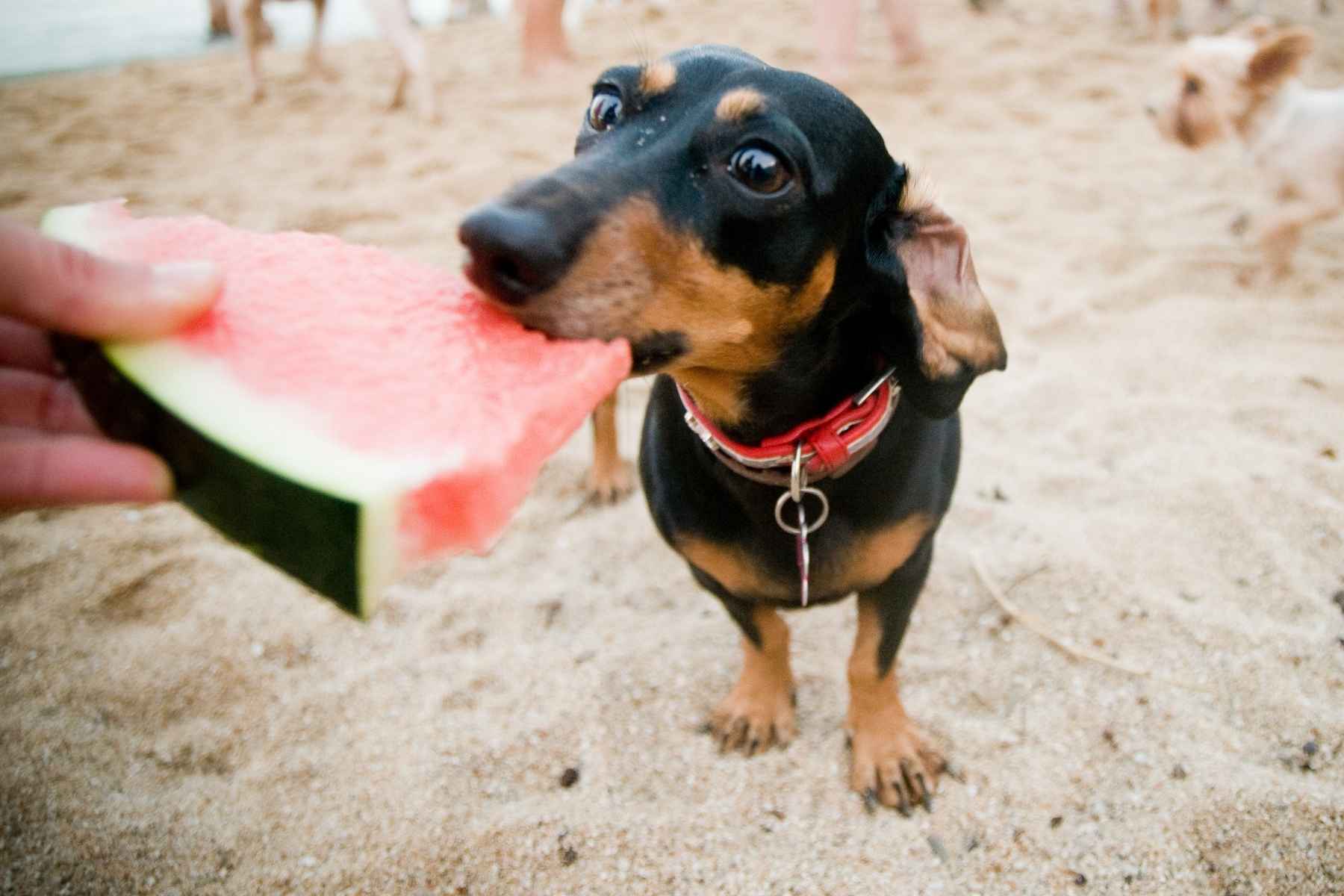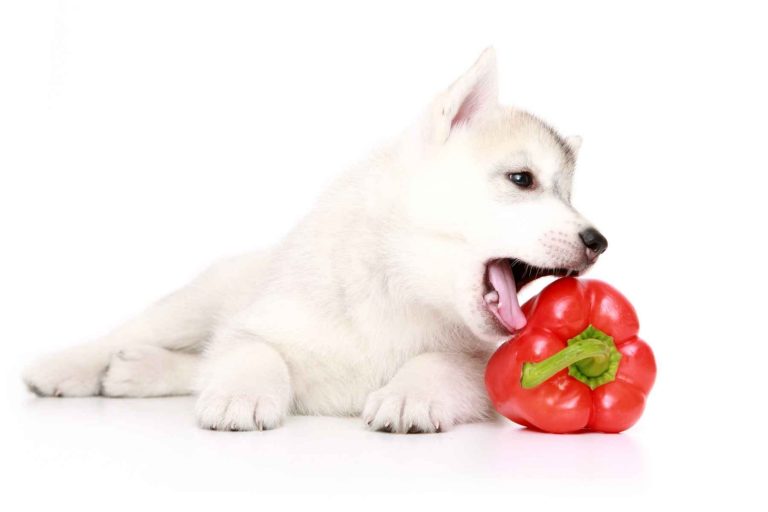Can Dogs Eat Watermelon?

On a hot summer’s day, watermelon is the perfect treat to provide us with sweetness and refreshment, but is it safe to share with your dog?
The good news is that, for the most part, yes, watermelon is safe to share with your dogs. However, before giving them a slice, remove all seeds, skin, and rind because these can cause severe gastrointestinal issues in dogs. Stick with the pink flesh, and you’ll be fine.
Continue reading to discover whether or not dogs like watermelon, how much you can feed them in one sitting, and how to make your own doggy ice cream.
Can Dogs Eat Watermelon?
The fleshy part of a watermelon possesses several nutritional elements which are as beneficial for your dog’s health as they are for your own.
Watermelon is an excellent source of vitamins A, B6, and C, plus a healthy dose of potassium. In addition, this fruit provides fiber to aid the digestive process, and there is no cholesterol, fat, or sodium.
Though watermelon does contain natural sugars, it is 92% water and therefore unlikely to cause any harmful spikes in blood sugar. Instead, watermelon provides your canine with a sweet way to stay hydrated during the heat of the summer months.
Do Dogs Like Watermelon?
Like humans, every dog is different, so there’s no way to say for sure whether or not your dog will like the refreshing taste of this vibrant fruit.
Dogs are often curious about the food we consume and may want to try a bite just because you take a bite. Though there is every chance they’ll love it for its cool boost of hydration on a hot, dry day or its sweet juicy flavor.
Can Dogs Eat Watermelon Seeds?
While the fleshy fruit may be a good source of nutrients for your pup, the seeds are not. One or two might not be a big deal, but just a small handful of seeds can cause intestinal blockages in your dog, requiring surgery to remove.
Can Dogs Eat Watermelon Rind?
Dogs should not eat watermelon rind (the hard, green outer shell) as it can lead to gastrointestinal issues such as vomiting and diarrhea.
It’s okay if your dog has a little nibble on the light green inner, but the dark rind is far too tough for them to chew and digest.
Is Watermelon Good For My Dog?
Watermelon has a surprising number of health benefits for your dog, thanks to its high nutritional value and significant water content. This food is 92% water, which helps your dog stay hydrated during a hot day, and the fruit’s antioxidants help repair damaged cells and keep them healthy.
Lycopene gives the watermelon is vibrant red hue, and this wonderful ingredient supports your dog’s vision and helps reduce the risk of cancer.
Vitamin A increases the quality of your dog’s coat, nerves, and muscles; vitamin B6 regulates hormones and fluid balance, and vitamin C boosts the immune system. In addition, a healthy level of fiber aids in the digestive process and helps prevent any blockages in the intestines.
How Do I Feed Watermelon To My Dog?
Watermelon is the perfect treat for a dog on a hot summer’s day as long as you prepare it correctly for them.
If you can, opt for seedless varieties; otherwise, remove all of the seeds by hand before serving. Additionally, cut the melon into small, manageable chunks for your pup.
There are a number of ways that you can prepare this treat for your pup:
- Frozen treats. Pre-cut a piece of watermelon into chunks, remove the seeds, and place in the freezer. That way, you’ll have bite-sized treats ready to go when the sun shines.
- Watermelon puree. Alternatively, puree your watermelon chunks and freeze them in an ice cube tray for a nourishing and refreshing treat.
- Watermelon ice cream. So long as your dog isn’t lactose intolerant, you could add a spoonful of plain, unsweetened yogurt. The cultures in yogurt can help aid your dog’s digestion and is a far better substitute for ice cream.
Before you feed any human foods to your dog, it’s always a good idea to talk it through with your vet first. They can alert you to potential dangers and help you make intelligent choices for your pup’s nutrition.
Can My Dog Eat Watermelon Treats?
If you want to treat your dog to watermelon, stick to the actual fruit. Flavoured treats often contain high amounts of sugar and additives, which can harm your dog’s health.
Large amounts of sugar have short and long-term effects on a dog’s health. Too much sugar in the short term can cause stomach upset in your dog; in the long term, too much of this sweet substance can lead to obesity and diabetes.
Is The Sugar In Watermelon Bad For My Dog?
Like many fruits, watermelon possesses a reasonably significant amount of natural sugar, which can be challenging for the bodies of animals such as dogs to digest.
However, watermelon is low-calorie, sodium, fat, and cholesterol-free, making it a reasonably healthy choice for your dog. Plus, the fruit’s fiber helps to insulate sugar and prevent it from being released into the bloodstream too quickly.
Proceed with caution, though, if your dog has diabetes. When this is the case, you’ll need to be particularly careful to get the right sugar balance in their diet, and it’s best to consult your vet to get the right portion size.
How Much Watermelon Should I Feed My Dog?
As a rule, treats should only make up 10% of your dog’s overall food intake. Regardless of how big or small your dog is, only substitute one-tenth of their daily diet with watermelon or other human foods.
Watermelon may possess various health benefits, but optimum nutrition for your dog comes from the foods designed especially for them.
Some human foods are okay for the odd treat, but keep your canine’s diet rich in dog food to meet their all-around health needs.
What Happens If My Dog Eats Too Much Watermelon?
Watermelon is a tasty treat for your pup, but it should be a treat, not a meal replacement. Dogs need a balanced and well-rounded diet to stay in optimum health; if you fail to provide them with sufficient nutrition, their health will start to suffer.
If your dog eats too much watermelon, you will probably notice signs of an upset tummy such as vomiting or diarrhea. When giving your dog watermelon for the first time, try feeding them a small amount to see how they react. And for the best advice on portion size, consult with your vet.
When Is It Dangerous For My Dog To Eat Watermelon?
Watermelon could threaten your dog if they ingest the skin, rind, or seeds. The skin and rind are challenging for a canine to digest, while consuming the seeds can lead to intestinal blockages.
Some dogs will pass the seeds, but small dogs, in particular, face a real threat from consuming this part of the fruit’s interior.
The best way to keep watermelon safe for your dog is to prepare it yourself, removing any hazardous elements before allowing your dog to take a nibble. If you suspect that they have ingested the seeds or rind keep a close eye on them.
If they show any symptoms of an intestinal blockage, such as constipation, vomiting, or lethargy, take them for a consultation with your vet immediately. You’ll need to monitor them for symptoms for a minimum of 24 hours after consumption.
Can Dogs Be Allergic To Watermelon?
Yes, like any food, your dog could have an allergy to watermelon, though this is very unlikely. If you notice any unusual symptoms when your dog consumes this tasty treat (such as vomiting or diarrhea), consult your vet or the Pet Poison helpline.
Can Dogs Eat Other Fruits?
Dogs can eat some other fruits but not all of them. Fruits such as apples, mangos, and oranges are great vitamin sources for dogs (as long as you remove any skin, seeds, and stalks before serving)
In contrast, you should never feed your dog avocados, cherries, grapes, or tomatoes. Avocados contain persin, which is toxic and often causes gastrointestinal upset in dogs, and cherry plants contain toxic cyanide, which prevents the cells of your dog’s body from obtaining enough oxygen.
Grapes are one of the most toxic fruits for dogs and can lead to kidney failure, while the green portions of a tomato plant contain solanine, which is toxic to dogs.
Final Thoughts
Watermelon can provide a sweet, refreshing treat to your dog and yourself. As long as you prepare it correctly, there’s no reason why your dog can’t eat watermelon with you.
Steer clear of “watermelon” treats that often contain excess sugar and additives, and stick with the natural fruit. Finally, with any human food, remember that it’s a treat for your dog and keep their intake of these treat foods below 10% of their overall daily food intake.






